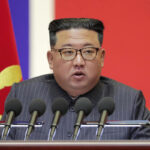
UNITED NATIONS (AP) — China on Wednesday blocked the imposition of U.N. sanctions sought by the United States and India against the deputy chief of Jaish-e-Mohammad, a Pakistan-based extremist group designated by the United Nations as a terrorist organization.
Abdul Rauf Azhar has been under U.S. sanctions since December 2010 for acting for or on behalf of the group, known as JEM. India says Azhar was involved in the planning and execution of numerous terror attacks, including the 1999 hijacking of an Indian Airlines aircraft, the 2001 attack on the Indian Parliament and the 2016 attack on the Indian air force base in Pathankot.
In June, China put a hold on adding Abdul Rehman Makki, deputy chief of another Pakistani group proscribed by the U.N., Lashkar-e-Taiba, to the U.N. blacklist. Makki has been under U.S. sanctions since November 2010, and India says he has been involved in raising funds, recruiting and radicalizing young people to resort to violence, and planning attacks, including in Mumbai in 2008.
According to Pakistan’s counter-terrorism agency, the government has outlawed more than 65 militant groups, including Jaish-e-Mohammad and Lashkar-e-Taiba.
“We placed a hold because we need more time to study the case,” said the spokesperson at China’s U.N. Mission, who was not authorized to speak publicly.
He said the U.N. Security Council committee monitoring sanctions allows “holds” on people proposed for sanctions, “and there have been quite a number of similar holds by committee members on listing requests.”
A spokesperson for the U.S. Mission to the United Nations, who was also not authorized to speak publicly, said the United States “respects other countries’ need to verify” that people proposed for sanctions meet their threshold for evidence required to justify being put on the U.N. sanctions blacklist.
“We strongly believe in the importance of the committee, which is to prevent and hold ISIS, al-Qaeda and their affiliates accountable for their illicit activities,” the U.S. spokesperson said. “Further, the United States values cooperation with our Security Council partners to effectively use this tool in an apolitical way to stop terrorists from exploiting the global order to do their misdeeds.”




